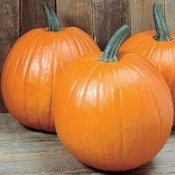 Veggie growth in most edible gardens is about done because of the cooler night-time temps and fewer hours of daylight. With less going on, it’s time to think about fall clean-up.
Veggie growth in most edible gardens is about done because of the cooler night-time temps and fewer hours of daylight. With less going on, it’s time to think about fall clean-up.
There may still be a few green tomatoes and beans and other veggies that can be left to ripen until there’s threat of frost. But be sure they are harvested before frost or freeze. Root veggies such as carrots and onions can stay in the ground a little while longer.
Also pay attention to foraging critters since squirrels, skunks and raccoons are getting into late-season corn, squash and pumpkins. If they’re active in your area, it’s probably a good idea to harvest as much as you can as soon as you can.
Before you start pitching debris into the trash or compost pile, do these four sustainable things:
- Ask, “What have I got for fall décor?” Look for interesting shapes, textures and color found in squash, pumpkins, gourds or corn stalks and use them for fall decorating.
- Harvest herbs to use over the winter. Cut thyme, oregano, chives, basil, etc., and bring them in to dry. Store them in a cool, dry place. Or freeze herbs in water in ice-cube trays and pop them out as needed to flavor soups and stews.
- Gather seeds to plant next year. They should be heirlooms in order to produce the same plant. Hybrids are a gamble because squash and pumpkins, for example, might cross over and next year’s crop could look and taste much different than this year’s harvest.
- Finally, make a map of where everything was planted this year. After the spring thaw, you may not remember exactly where you planted the peas. Having a map is important so that crops can be rotated yearly in order to keep the soil fresh and lively.
Composting garden debris
It’s always wise to compost yard debris and avoid sending it to the landfill. But there are some precautions to keep in mind.
- If you had blight, powdery mildew or a fungus, put these plants into a bag in the trash and use bleach to sterilize containers they grew in or the cages and trellises they grew on. This avoids transferring plant diseases into next year’s garden.
- Also avoid composting large vines from pumpkin or squash plants as they won’t easily decompose.
- Then, compost the remaining plant debris.
The final tuck-in
Add fertilizer low in nitrogen and spread 2″ of compost over the top of the garden. Don’t worry if you can’t get the compost down before it snows. You can pitch compost over the snow and it will still do its job – but this task should be done sooner rather than later.
Fall clean-up, fertilizer and compost gives your garden the healthy rest it needs from now ’til the wake-up call next spring.
Contact Designscapes Colorado at info@designscapes.org for more information.
